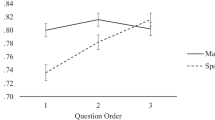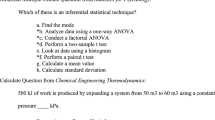Abstract
A major challenge college students face is retaining the knowledge they acquire in their classes, especially in cumulative disciplines such as engineering, where ultimate success depends on long-term retention of foundational content. Cognitive psychologists have recently recommended various techniques educators might use to increase retention. One technique (spaced retrieval practice) involves extending opportunities to retrieve course content beyond a customarily short temporal window following initial learning. Confirming the technique’s utility requires demonstrating that it increases retention in real classroom settings, with commonly encountered educational content, and that gains endure into subsequent semesters. We manipulated spaced versus massed retrieval practice in a precalculus course for engineering students and followed a subset of students who proceeded into a calculus class the following semester. Spacing versus massing was manipulated within- and between-subjects. Within-subjects, students retained spaced content better than massed content in the precalculus course. Between-subjects, students for whom some retrieval practice was spaced, compared to those for whom all practice was massed, performed better on the final exam in the precalculus class and on exams in the calculus class. These findings suggest that spaced retrieval practice can have a meaningful, long-lasting impact on educational outcomes.


Similar content being viewed by others
Notes
With two exceptions, no covariate had a significant main or interactive effect on any performance measure in either Introductory Calculus for Engineers or Engineering Analysis I. One exception is a significant interaction between gender and objective type in the within-subjects analysis of final exam performance in Introductory Calculus for Engineers, F(1, 35) = 9.77, p = .004, η 2 = .183. The interaction arose because a significant difference in performance between spaced and massed objectives occurred for male but not female students. The other exception is that high school GPA was significantly associated with performance on the first unit exam in Engineering Analysis I, F(1, 64) = 4.63, p = .035, η 2 = .063. Both findings, while potentially interesting, may be spurious because, one, the number of female students was less than 20 (N = 13) and hence too small to instill much confidence in the result (see Simmons, Nelson, and Simonsohn 2011), and, two, high school GPA was not significantly associated with any other performance measure.
References
Alter, A. L., Oppenheimer, D. M., Epley, N., & Eyre, R. N. (2007). Overcoming intuition: metacognitive difficulty activates analytic reasoning. Journal of Experimental Psychology: General, 136, 569–576.
Bacon, D. R., & Stewart, K. A. (2006). How fast do students forget what they learn in consumer behavior? A longitudinal study. Journal of Marketing Education, 28, 181–192.
Balota, D. A., Duchek, J. M., Sergent-Marshall, S. D., & Roediger, H. L., III. (2006). Does expanded retrieval produce benefits over equal-interval spacing? Explorations of spacing effects in healthy aging and early stage Alzheimer’s disease. Psychology and Aging, 21, 19–31.
Beanland, D. G. (2010). Challenges and opportunities facing the education of engineers. Retrieved from https://www.engineersaustralia.org.au/sites/default/files/shado/Divisions/Victoria%20Division/Groups/Senior%20Engineers%20Group/seg_march2010.pdf.
Butler, A. C., Marsh, E. J., Slavinsky, J. P., & Baraniuk, R. G. (2014). Integrating cognitive science and technology improves learning in a STEM classroom. Educational Psychology Review, 26, 331–340.
Carpenter, S. K. (2012). Testing enhances the transfer of learning. Current Directions in Psychological Science, 21, 279–283.
Carpenter, S. K. (2014). Spacing and interleaving of study and practice. In V. A. Benassi, C. E. Overson, & C. M. Hakala (Eds.), Applying the science of learning in education: infusing psychological science into the curriculum (pp. 131–141). American Psychological Association.
Carpenter, S. K., Pashler, H., & Cepeda, N. J. (2009). Using tests to enhance 8th grade students’ retention of U.S. history facts. Applied Cognitive Psychology, 23, 760–771.
Cepeda, N. J., Pashler, H., Vul, E., Wixted, J. T., & Rohrer, D. (2006). Distributed practice in verbal recall tasks: a review and quantitative synthesis. Psychological Bulletin, 132, 354–380.
Cepeda, N. J., Vul, E., Rohrer, D., Wixted, J. T., & Pashler, H. (2008). Spacing effects in learning: a temporal ridgeline of optimal retention. Psychological Science, 19, 1095–1102.
Chan, J. C. K., McDermott, K. B., & Roediger, H. L., III. (2006). Retrieval-induced facilitation: initially nontested material can benefit from prior testing of related material. Journal of Experimental Psychology. General, 135, 553–571.
Cherry, K. E., Simmons, S. S., & Camp, C. J. (1999). Spaced retrieval enhances memory in older adults with probable Alzheimer’s disease. Journal of Clinical Geropsychology, 5, 159–175.
Conway, M. A., Cohen, G., & Stanhope, N. (1991). On the very long-term retention of knowledge acquired through formal education: twelve years of cognitive psychology. Journal of Experimental Psychology. General, 120, 395–409.
Cranney, J., Ahn, M., McKinnon, R., Morris, S., & Watts, K. (2009). The testing effect, collaborative learning, and retrieval-induced facilitation in a classroom setting. European Journal of Cognitive Psychology, 21, 919–940.
Cull, W. L. (2005). Untangling the benefits of multiple study opportunities and repeated testing for cued recall. Applied Cognitive Psychology, 14, 215–235.
Delaney, H. D., & Maxwell, S. E. (1981). On using analysis of covariance in repeated measures designs. Multivariate Behavioral Research, 16, 105–123.
Delaney, P. F., Verkoeijen, P. P. J. L., & Spirgel, A. (2010). Spacing and testing effects: a deeply critical, lengthy, and at times discursive review of the literature. Psychology of Learning and Motivation, 53, 63–147.
Dunlosky, J., Rawson, K. A., Marsh, E. J., Nathan, M. J., & Willingham, D. T. (2013). Improving students’ learning with effective learning techniques: promising directions from cognitive and educational psychology. Psychological Science in the Public Interest, 14, 4–58.
Ebbinghaus, H. (1964). Memory: a contribution to experimental psychology (H. A. Ruger, C. E. Bussenius, & E. R. Hilgard, Trans.). New York: Dover Publications. (Original work published 1885).
Gates, A. I. (1917). Recitation as a factor in memorizing. Archives of Psychology, 6(40).
Goosens, N. A. M. C., Camp, G., Verkoeijen, P. P. J. L., & Tabbers, H. K. (2014). The effect of retrieval practice in primary school vocabulary learning. Applied Cognitive Psychology, 28, 135–142.
Hieb, J. L., Lyle, K. B., Ralston, P. A. S., & Chariker, J. (2015). Predicting performance in a first engineering calculus course: implications for interventions. International Journal of Mathematical Education in Science and Technology, 46, 40–55.
Kamuche, F. U., & Ledman, R. E. (2005). Relationship of time and learning retention. Journal of College Teaching & Learning, 2, 25–28.
Karpicke, J. D. (2009). Metacognitive control and strategy selection: deciding to practice retrieval during learning. Journal of Experimental Psychology. General, 138, 469–486.
Karpicke, J. D. (2012). Retrieval-based learning: active retrieval promotes meaningful learning. Current Directions in Psychological Science, 21, 157–163.
Karpicke, J. D., & Blunt, J. R. (2011). Retrieval practice produces more learning than elaborative studying with concept mapping. Science, 331, 772–775.
Karpicke, J. D., & Roediger, H. L., III. (2007). Expanding retrieval practice promotes short-term retention, but equally spaced retrieval enhances long-term retention. Journal of experimental psychology: learning, memory, and cognition, 33, 704–719.
Karpicke, J. D., & Roediger, H. L., III. (2008). The critical importance of retrieval for learning. Science, 319, 966–968.
Küpper-Tetzel, C. E., Erdfelder, E., & Dickhäuser, O. (2014). The lag effect in secondary school classrooms: enhancing students; memory for vocabulary. Instructional Science, 42, 373–388.
Landauer, T. K., & Eldridge, L. (1967). Effect of tests without feedback and presentation-test interval in paired-associate learning. Journal of Experimental Psychology, 75, 290–298.
Logan, J. M., & Balota, D. A. (2008). Expanded versus equal interval spaced retrieval practice: exploring different schedules of spacing and retention interval in younger and older adults. Aging, Neuropsychology, & Cognition, 15, 257–280.
Lyle, K. B., & Crawford, N. A. (2011). Retrieving essential material at the end of lectures improves performance on statistics exams. Teaching of Psychology, 38, 94–97.
Mayfield, K. H., & Chase, P. N. (2002). The effects of cumulative practice on mathematics problem solving. Journal of Applied Behavior Analysis, 35, 105–123.
McDaniel, M. A., Thomas, R. C., Agarwal, P. K., McDermott, K. B., & Roediger, H. L. (2013). Quizzing in middle-school science: successful transfer performance on classroom exams. Applied Cognitive Psychology, 27, 360–372.
McDermott, K. B., Agarwal, P. K., D’Antonio, L., Roediger, H. L., & McDaniel, M. A. (2014). Both multiple-choice and short-answer quizzes enhance later exam performance in middle and high school classes. Journal of Experimental Psychology: Applied, 20, 3–21.
Pashler, H., Cepeda, N. J., Wixted, J. T., & Rohrer, D. (2005). When does feedback facilitate learning of words? Journal of Experimental Psychology: Learning, Memory, and Cognition, 31, 3–8.
Pashler, H., Bain, P., Bottge, B., Graesser, A., Koedinger, K., McDaniel, M., & Metcalfe, J. (2007). Organizing instruction and study to improve student learning (NCER 2007–2004). Washington: National Center for Education Research, Institute of Education Sciences, U.S. Department of Education. Retrieved from http://ncer.ed.gov .
Paunesku, D., Walton, G. M., Romero, C., Smith, E. N., Yeager, D. S., & Dweck, C. S. (2015). Mind-set interventions are a scalable treatment for academic underachievement. Psychological Science, 26, 784–793.
Pearson, W., & Miller, J. D. (2012). Pathways to an engineering career. Peabody Journal of Education: Issues of Leadership, Policy, and Organizations, 87, 46–61.
Rawson, K. A., Dunlosky, J., & Sciartelli, S. M. (2013). The power of successive relearning: Improving performance on course exams and long-term retention. Educational Psychology Review, 25, 523–548.
Rickard, T. C., Lau, J. S.-H., & Pashler, H. (2008). Spacing and the transition from calculation to retrieval. Psychonomic Bulletin & Review, 15, 656–661.
Roediger, H. L., III, & Karpicke, J. D. (2006). Test-enhanced learning: taking memory tests improves long-term retention. Psychological Science, 17, 249–255.
Roediger, H. L., III, & Pyc, M. A. (2012). Inexpensive techniques to improve education: applying cognitive psychology to enhance educational practice. Journal of Applied Research in Memory and Cognition, 1, 242–248.
Rohrer, D. (2009). The effects of spacing and mixing practice problems. Journal for Research in Mathematics Education, 40, 4–17.
Rowland, C. A. (2014). The effect of testing versus restudy on retention: a meta-analytic review of the testing effect. Psychological Bulletin, 140, 1432–1463.
Rowland, C. A., & DeLosh, E. L. (2014). Benefits of testing for nontested information: retrieval-induced facilitation of episodically bound material. Psychonomic Bulletin & Review, 21, 1516–1523.
Simmons, J. P., Nelson, L. D., & Simonsohn, U. (2011). False-positive psychology: undisclosed flexibility in data collection and analysis allows presenting anything as significant. Psychological Science, 22, 1359–1366.
Sobel, H. S., Cepeda, N. J., & Kapler, I. V. (2011). Spacing effects in real-world classroom vocabulary learning. Applied Cognitive Psychology, 25, 763–767.
Taylor, K., & Rohrer, D. (2010). The effects of interleaved practice. Applied Cognitive Psychology, 24, 837–848.
Thios, S. J., & D’Agostino, P. R. (1976). Effects of repetition as a function of study-phase retrieval. Journal of Verbal Learning and Verbal Behavior, 15, 529–536.
Thomas, M. S. C., Annaz, D., Ansari, D., Serif, G., Jarrold, C., & Karmiloff-Smith, A. (2009). Using developmental trajectories to understand developmental disorders. Journal of Speech, Language, and Hearing Research, 52, 336–358.
Toppino, T. C., & Gerbier, E. (2014). About practice: Repetition, spacing, and abstraction. Psychology of Learning and Motivation, 60, 113–189.
White House (n.d.). Educate to innovate. Retrieved from https://www.whitehouse.gov/issues/education/k-12/educate-innovate.
Acknowledgments
This research was supported by a National Science Foundation Improving Undergraduate STEM Education Award.
Author information
Authors and Affiliations
Corresponding author
Ethics declarations
All procedures performed in studies involving human participants were in accordance with the ethical standards of the institutional and/or national research committee and with the 1964 Helsinki declaration and its later amendments or comparable ethical standards. The Institutional Review Board at our university waived the requirement for subjects in this research to provide informed consent. However, as stated in the manuscript, students were given the option to decline to have their performance data included in our analyses. No student declined. This article does not contain any studies with animals performed by any of the authors.
Rights and permissions
About this article
Cite this article
Hopkins, R.F., Lyle, K.B., Hieb, J.L. et al. Spaced Retrieval Practice Increases College Students’ Short- and Long-Term Retention of Mathematics Knowledge. Educ Psychol Rev 28, 853–873 (2016). https://doi.org/10.1007/s10648-015-9349-8
Published:
Issue Date:
DOI: https://doi.org/10.1007/s10648-015-9349-8




